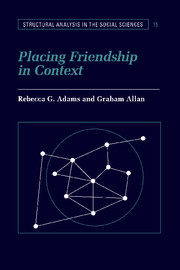Book contents
- Frontmatter
- Contents
- Notes on the contributors
- Acknowledgements
- 1 Contextualising friendship
- 2 The modernisation of friendship: individualism, intimacy, and gender in the nineteenth century
- 3 The gendered contexts of inclusive intimacy: the Hawthorne women at work and home
- 4 Friendship and the private sphere
- 5 Rich friendships, affluent friends: middle-class practices of friendship
- 6 Women's friendships in a post-modern world
- 7 Foci of activity as changing contexts for friendship
- 8 The demise of territorial determinism: online friendships
- 9 Reflections on context
- Index
- Structural Analysis in the Social Sciences
6 - Women's friendships in a post-modern world
Published online by Cambridge University Press: 15 December 2009
- Frontmatter
- Contents
- Notes on the contributors
- Acknowledgements
- 1 Contextualising friendship
- 2 The modernisation of friendship: individualism, intimacy, and gender in the nineteenth century
- 3 The gendered contexts of inclusive intimacy: the Hawthorne women at work and home
- 4 Friendship and the private sphere
- 5 Rich friendships, affluent friends: middle-class practices of friendship
- 6 Women's friendships in a post-modern world
- 7 Foci of activity as changing contexts for friendship
- 8 The demise of territorial determinism: online friendships
- 9 Reflections on context
- Index
- Structural Analysis in the Social Sciences
Summary
Introduction
It has become almost a cliché to observe that we are living in a post-modern world – a world where identity, truth, and rationality are all equally problematic. The implications of this for personal relationships in general, and for women's friendships in particular, have tended to be ignored. Nevertheless, there have been suggestions that, where discourses are relativistic, where power at many levels is diffuse, and where women are becoming an important economic and political constituency, their friendships with each other could play an important part in shaping their identities.
This theme will be explored first in the context of a discussion of the attractiveness of friendship as a relational form. It will be argued that friendships in a post-modern world are attractive because they offer a definition of self which is very much under the control of the individual participants. In addition, women's friendships with other women potentially offer an alternative definition of identity – or at least one which enables women to critique the dominant definition of themselves as ‘the Other’.
The second issue which the chapter takes up is the question of the variability of friendship as a relational form. It is argued that the preoccupation with intimate relationships obscures the importance of such relationships in maintaining the very real structures created by capitalism and patriarchy. Thus, it is suggested that it is unhelpful to dismiss the kind of inarticulate solidarity which sometimes characterises men's relationships, since it constitutes a kind of ego support, but one which is at the positional rather than the personal level.
- Type
- Chapter
- Information
- Placing Friendship in Context , pp. 117 - 135Publisher: Cambridge University PressPrint publication year: 1999
- 4
- Cited by



